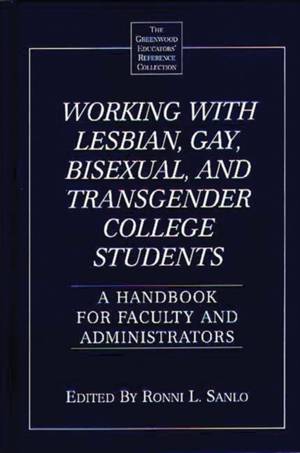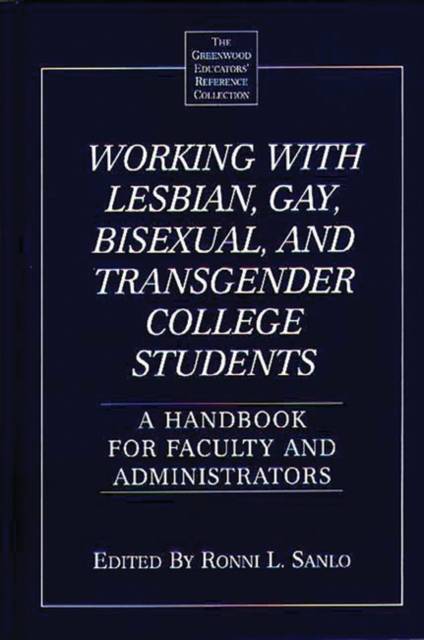
- Afhalen na 1 uur in een winkel met voorraad
- Gratis thuislevering in België vanaf € 30
- Ruim aanbod met 7 miljoen producten
- Afhalen na 1 uur in een winkel met voorraad
- Gratis thuislevering in België vanaf € 30
- Ruim aanbod met 7 miljoen producten
Working with Lesbian, Gay, Bisexual, and Transgender College Students
A Handbook for Faculty and Administrators
Ronni SanloOmschrijving
This handbook is intended for faculty and administrators who wish to create a welcoming and safe environment for all lesbian, gay, bisexual and transgender students on our campuses. It will help readers, even those who may struggle personally with understanding non-heterosexual identities, gain a clearer understanding of the important issues facing these students. While some students arrive on campus with full clarity about their sexual identities, others may just be discovering their orientations while in our institutions. It is difficult to provide the attention LGBT students need if we do not understand the crises affecting them or how to address them. Each chapter analyzes specific issues affecting these students and offers recommendations or suggestions for change. Some of the areas discussed include: identity development theories, residence halls, career planning, health and counseling centers, HIV/AIDS, and student leadership and organizational development. Non-heterosexual faculty and staff may also find this work useful as they attempt to discover themselves in academic and educational literature.
Lesbian, gay, bisexual, and transgender students are on our campuses. They are either discovering their orientations while in our institutions or arriving with full clarity about their sexual identities. It is difficult to provide the attention these students need if we do not understand the issues or how to address them. This handbook is a guide to providing services to lesbian, gay, bisexual, and transgender students. It is for all faculty and administrators, especially those who may struggle personally with understanding non-heterosexual identities, who wish to create a safe and welcoming environment for all students. Non-heterosexual faculty and staff may also find this work useful as they attempt to discover themselves in academic and educational literature. Each section presents an area in which questions usually arise. Chapters within the sections dissect specific issues and, where appropriate, offer recommendations for change. Some of those areas include: identity development theories; residence halls; career planning; health and counseling centers; HIV/AIDS; students with disabilities; same-sex dating and domestic violence; athletics; fraternities; student leadership; speakers' bureaus and safe zone programs; commuter schools and church-related institutions; and Internet resources.Specificaties
Betrokkenen
- Auteur(s):
- Uitgeverij:
Inhoud
- Aantal bladzijden:
- 488
- Taal:
- Engels
- Reeks:
Eigenschappen
- Productcode (EAN):
- 9780313302275
- Verschijningsdatum:
- 21/05/1998
- Uitvoering:
- Hardcover
- Formaat:
- Genaaid
- Afmetingen:
- 163 mm x 241 mm
- Gewicht:
- 834 g

Alleen bij Standaard Boekhandel
Beoordelingen
We publiceren alleen reviews die voldoen aan de voorwaarden voor reviews. Bekijk onze voorwaarden voor reviews.









